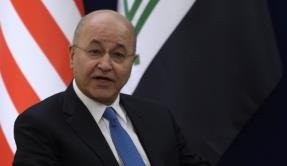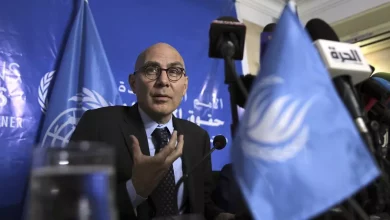middle east
Iraqi cleric Sadr scales back his militia
[su_label type=”info”]SMA News – Agencies [/su_label][su_spacer size=”10″] Iraqi cleric Moqtada al-Sadr, whose political bloc came first in a May parliamentary election, said on Thursday he was scaling back his militia to strengthen the incoming government and its security forces.
The cleric’s list won the most seats in an election marred by low turnout and allegations of fraud.
He is currently embroiled in negotiations with the heads of other blocs over forming the next government, in which he is expected to play a leading role.
Sadr said in a handwritten order published on his website that his Saraya al-Salam (Peace Companies) militia must disband in all cities except for the capital Baghdad and the cities of Karbala and Samarra, both homes to holy Shi’ite shrines.
The cleric had earlier this month called for a nationwide disarmament campaign after an arms cache exploded in his stronghold district of Sadr City in Baghdad, killing 18 people. Political opponents said the cache had belonged to his militia.
His Thursday order called on his men to store arms in a manner that protects civilians. All the militia’s leaders except those in the three named cities were prohibited from “activities on the ground”.
Sadr said the militia was also now banned from conducting any operation outside Iraq, and all weapons received from the government and its security forces were to be returned.
Like most Iraqi political leaders, Sadr has consistently maintained a powerful militia.
In the past he has mobilized tens of thousands of followers to protest against government policies and has been seen as a wild card in Iraq’s turbulent politics, which is often driven by sectarian interests.
His militia, once known as the Mehdi Army, staged two violent uprisings against U.S. occupation forces after their invasion of Iraq and toppling of Saddam Hussein.
Iraqi and U.S. officials described him at the time as the biggest security threat in Iraq.
The cleric’s list won the most seats in an election marred by low turnout and allegations of fraud.
He is currently embroiled in negotiations with the heads of other blocs over forming the next government, in which he is expected to play a leading role.
Sadr said in a handwritten order published on his website that his Saraya al-Salam (Peace Companies) militia must disband in all cities except for the capital Baghdad and the cities of Karbala and Samarra, both homes to holy Shi’ite shrines.
The cleric had earlier this month called for a nationwide disarmament campaign after an arms cache exploded in his stronghold district of Sadr City in Baghdad, killing 18 people. Political opponents said the cache had belonged to his militia.
His Thursday order called on his men to store arms in a manner that protects civilians. All the militia’s leaders except those in the three named cities were prohibited from “activities on the ground”.
Sadr said the militia was also now banned from conducting any operation outside Iraq, and all weapons received from the government and its security forces were to be returned.
Like most Iraqi political leaders, Sadr has consistently maintained a powerful militia.
In the past he has mobilized tens of thousands of followers to protest against government policies and has been seen as a wild card in Iraq’s turbulent politics, which is often driven by sectarian interests.
His militia, once known as the Mehdi Army, staged two violent uprisings against U.S. occupation forces after their invasion of Iraq and toppling of Saddam Hussein.
Iraqi and U.S. officials described him at the time as the biggest security threat in Iraq.








